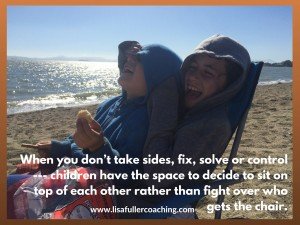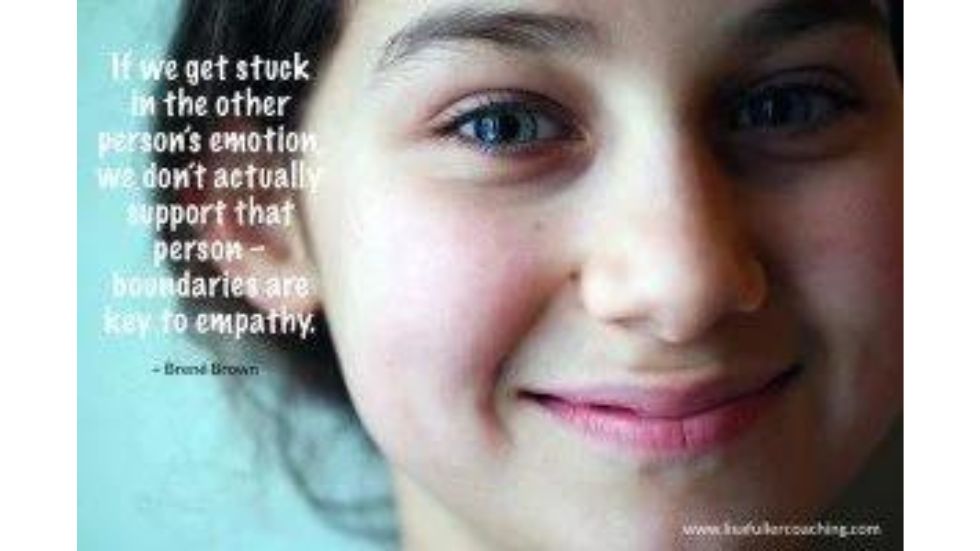
Why Lazy Parenting Maybe the Ticket to Raising Smarter, More Responsible Kids
It just slipped out. I didn’t mean to say in front of the 25 parents who’d come to learn strategies to solve sibling conflict. There’s something about it that just didn’t sound right. Actually it sounded like the antithesis to everything out there selling like hotcakes in the world of public opinion parenting.
I said it. “Positive Discipline (PD) is lazy parenting.”
While that’s not exactly accurate, it can feel effortless when you’re in the PD Zone compared to the prevailing helicopter/effortful parenting mode.
Here’s what I see with parents I work with and what I’ve experienced firsthand…
You’re working so hard to parent your child in a way that will encourage them to grow into loving, responsible, contributing members of society. Let’s add a cherry or two on top and throw in hard working, honest, happy, conscious of the world around them, yada yada the list goes on.
Looking at it straight on, it’s freaking intimidating.
No wonder you’re stressed about the hitting, lying, excluding, whining, complaining, isolating, arguing and bad attituding that’s happening today.
Who has the luxury to be lazy when vigilance is required to produce the qualities you know are so important for your child’s success?
What’s clear is that while control might feel necessary, and to some degree satisfying, in the moment, control, as a parenting style doesn’t invite the long term character traits you desire.
In short, control creates hollow results. When you do it all for your child (decide it all, manage it all, enforce it all), you inadvertently rob your kids of the opportunity to practice valuable life skills that they can only learn by doing.
With ‘good character’ as the destination, your child must travel through mistake-ville which inevitably leads to growth-town. They need to learn how to solve problems and think critically about the world around them in order to become who you want them to be. And that takes practice.
I stand behind what I said. [tweetthis]Positive Discipline can feel downright relaxing at times – – – lazy even. And that’s a good thing![/tweetthis]
Here are three real life examples, featuring a variety of ages, followed by the how-to tips for effective lazy parenting.
Example #1 from Kelly:
 While enrolled in my spring sibling series, Kelly sent me this email after our first session.
While enrolled in my spring sibling series, Kelly sent me this email after our first session.
These pictures were taken on Father’s Day right after I used “put in same boat” technique & validation. The boys were fighting over the chair (we only had one) and I said, “hmm, one chair and two boys?”... Then Emmett had a solution. Xo
“hmm, one chair and two boys?”… elegant indeed. No refereeing or setting a timer to make sure it was fair, just a simple, observing, genuinely curious question.
 Kelly’s story reminds me that when you don’t take sides, fix, solve, control — children have the space to use their own intelligence to figure things out and come up with their own, often elegant solutions.
Kelly’s story reminds me that when you don’t take sides, fix, solve, control — children have the space to use their own intelligence to figure things out and come up with their own, often elegant solutions.
That said, if your children are accustomed to you fixing, solving, refereeing, it will take training, practice, and time for them to reach for their own intelligence when faced with a problem.
Kelly’s tool of choice in this example was to ask a curiosity question (being genuinely curious about what solution they would come up with!) while treating kids the same (in PD lingo we call this putting them in the same boat… or in this case chair!)
Example #2 from Rochelle:
I have long been critical of parents who swoop in to solve their kids’ social problems, whether they be in school or on the athletic field. But when it comes to homework, I was clearly piloting this ‘chopper.’ Despite the fact that my son was just two years away from going off to college, I was still checking the online homework program for assignments and grades on a daily basis and harping at him about the status and quality of his work.
Both of us were miserable: my son blamed me if he missed an assignment and I felt angry because he wasn’t taking responsibility for his own work. But why should he? How could he, when I was always looking over his shoulder?
This year my husband and I decided we would take a different approach, we’d let our son be the master of his own destiny, free to make his own mistakes.
It was scary; he’s a junior in high school and there’s a lot of pressure on him to do well in school. While we worried that our messy, disorganized son, would lose important papers and forget about tests or quizes, we have been more than pleasantly surprised. He has risen to the occasion.
When he forgot to do an AP assignment, he took responsibility for his inaction, contacted the teacher and asked for an extension. It was the first time I could genuinely say I hoped she would be supportive and honor his request. He’s learning to take responsibility, we’re learning to let go and let him succeed (or fail) on his own, and our relationship is so much stronger for it.
Rochelle’s tool: having faith in her son period and showing faith in him by giving him the opportunity to make mistakes and then learn from his mistakes. Rochelle is taking the long range view, knowing the lessons he will learn outweigh the in-the-moment forgotten assignments, etc.
Example # 3 from Eric:
Eric emailed me this success story while he was enrolled in my series:
Last week on my way home from work, my wife Stephanie sent me a text that our daughter Grace (5) was being a handful, was in a horrible mood, and that Stephanie had had it with her.
When I got home, I walked into the house and went straight to Grace and asked her for a hug. At first she turned her back and crossed her arms, and said no. I then decided to ask her one more time and after a 5 second pause, she turned and gave me a big hug.
Steph said it was like someone flipped a switch on Grace. Grace went from being in the worst mood to acting as if she was having the best day ever.
It’s amazing to see the kind of impact and dynamics that something as simple as asking for a hug can have on a 5 year old. Honestly, before taking your class, I probably would have come home and punished Grace for misbehaving and the entire afternoon would have been ruined for the entire family.
Eric’s tool: Asking for a hug (note this does NOT mean asking your child, “do YOU need a hug?” You spark your child’s sense of significance when you ASK them for a hug signalling that your child makes a difference to you — they’re giving you a hug has an impact.) Pretty easy.
Warning: Don’t try letting go of control once and give up when the results don’t look exactly as you’d hoped. Children need to adjust to your new behavior — they’ll test and maybe test some more until they can trust your change is enduring.
What does lazy parenting require from us?
- Flexibility – if you’re not dictating and controlling the outcome, you need to be open to a different outcome.
- Patience – when children are figuring it out they’re bound to make mistakes, a mess, etc. Beam out to remember the bigger picture — long term character building and ahhhh lazy parenting!
- Humility – finding that place inside that accepts your limits – you might not have the answer, and what a relief that you don’t have to solve every problem.
- Faith in your kids — messy faith. Their solution may not look good and the neighbors could see or hear a mess. Your belief in them, regardless of what their solution looks like, will go a long way to build their problem-solving muscles.
What Kelly, Rochelle and Eric demonstrated seemed pretty easy and parenting can be— AT TIMES — when we’ve established a relationship of trust. Lazy, or if it makes you feel better, call it ‘conscious effortless parenting’ is possible, feels awesome, and can be yours!.
I want that for you!
Share your experience of lazy parenting in the comments below. Don’t be shy.
Want to read more about this topic? Here’re some good posts:
Being “In Control” – The Possible and Impossible In Parenting from Hand in Hand


 to tell her the emotions would pass or it didn’t matter or that the part was probably better than she thought, blah, blah, blah. This is cause for celebration! When you’re done partying let’s look at what you describe your fear of the potential bad news that she didn’t get a “good” part. Your feeling of fear fuels your underlying belief that something needs to be fixed. You can do one of two things here, keep your fear AND bite your tongue, which
to tell her the emotions would pass or it didn’t matter or that the part was probably better than she thought, blah, blah, blah. This is cause for celebration! When you’re done partying let’s look at what you describe your fear of the potential bad news that she didn’t get a “good” part. Your feeling of fear fuels your underlying belief that something needs to be fixed. You can do one of two things here, keep your fear AND bite your tongue, which
